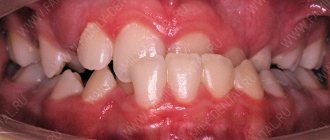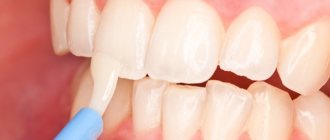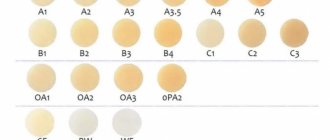Author of the article:
Soldatova Lyudmila Nikolaevna
Candidate of Medical Sciences, Professor of the Department of Clinical Dentistry of the St. Petersburg Medical and Social Institute, Chief Physician of the Alfa-Dent Dental Clinic, St. Petersburg
The human body is a kind of unified mechanism, the elements of which are closely interconnected. The health of all organs, including teeth, depends on the quality of products, the balance of the diet and, accordingly, the amount of nutrients received.
Everyone knows that calcium is necessary to strengthen teeth. But few people know about which products this element is best absorbed from, what other vitamins and minerals they need, what strengthening products to use and what nutrition can support the health and good condition of teeth. Let's figure out what vitamins adults and children need to strengthen tooth enamel.
Alphabet Classic
Regular plaque removal at the dentist's office is important. Pathological deposits are easier and faster to remove in a soft state, without waiting for them to harden. This will prevent disease of the gum tissue and crowns.
A complex of three types of tablets: calcium, antioxidants, iron has a positive effect on the oral cavity. The tablets are taken daily, one from each group. The drug has a positive effect not only on the oral cavity, but on the entire body. Vitamin balance must be maintained at all times. The Alphabet includes 13 vitamins and 10 minerals.
Clinical researches
Clinical studies have proven that regular use of professional toothpaste ASEPTA REMINERALIZATION improved the condition of the enamel by 64% and reduced tooth sensitivity by 66% after just 4 weeks.
Sources:
- Report on the determination/confirmation of the preventive properties of personal oral hygiene products “ASEPTA PLUS” Remineralization doctor-researcher A.A. Leontyev, head Department of Preventive Dentistry, Doctor of Medical Sciences, Professor S.B. Ulitovsky First St. Petersburg State Medical University named after. acad. I.P. Pavlova, Department of Preventive Dentistry
- Clinical experience in using the Asepta series of products Fuchs Elena Ivanovna Assistant of the Department of Therapeutic and Pediatric Dentistry State Budgetary Educational Institution of Higher Professional Education Ryazan State Medical University named after Academician I.P. Pavlova of the Ministry of Health and Social Development of the Russian Federation (GBOU VPO RyazSMU Ministry of Health and Social Development of Russia)
- The use of new anti-inflammatory drugs in the complex of therapeutic and preventive measures for periodontal diseases (E.D. Kuchumova, A.A. Leontyev, O.V. Kalinina, L.Yu. Orekhova, S.B. Ulitovsky) E.D. Kuchumova, Ph.D., Associate Professor, A.A. Leontyev, dentist, O.V. Kalinina, dentist, L.Yu. Orekhova, Doctor of Medical Sciences, Professor, Head of Department, S.B. Ulitovsky, Doctor of Medical Sciences, Prof. Department of Therapeutic Dentistry of St. Petersburg State Medical University named after. acad. I.P. Pavlova
Vitamin and mineral "Asepta"
This complex is needed to balance the amount of nutrients. After all, nutrition does not always fully provide the body with the necessary substances. Today you can buy ready-made complexes in pharmacies. The drug "Asepta" strengthens the gums and chewing organs. It consists of the following components: A, C, B3, B9, B6 and D3. An additional substance is green tea extract. It prevents inflammation, has an antiseptic effect, and prevents the appearance of caries and bleeding gums.
Top 8 healthy foods for gums
Bleeding, weak and pathologically altered gums will not be able to support healthy teeth. That is why, first of all, you should select useful substances for healthy gums, and then strengthen your teeth.
In numerous illustrations showing healthy foods for teeth in pictures , you can see what foods should be included in the diet to maintain healthy gums:
- Pumpkin, carrots, and apples, due to their structure and chemical composition, ideally keep gums in order.
- Dairy products strengthen the circulatory system.
- Leafy vegetables contain a large amount of vitamins.
- Sea fish is full of multivitamins and healthy fats.
- Garden and forest berries are a real chest of vitamins.
Eating these foods daily will lead to healthy teeth. They are oversaturated with vitamin complexes and other useful components, adjust metabolic processes in tissues and clean teeth from plaque. As a result, the gums become strong and the teeth become healthy.
Vitrum Calcium
Vitamins for teeth for adults and children are an important component of good health. The child must first receive D and A in order for his chewing organs to fully develop. With a deficiency of these substances, the units become distorted and stomatitis appears. If the baby cannot consume enough dairy products, eggs, fish liver, bell peppers, greens, carrots, butter, cabbage, the baby is prescribed vitamin and mineral complexes. When choosing a drug for teenagers, pay attention to the proportion of calcium, phosphorus, magnesium, zinc, iron, and copper. "Vitrum Calcium" is approved for use from 12 years of age. A special feature of the complex is strengthening the structure of hard tissues, preventing the crumbling of crowns and the development of caries.
Useful products containing micro- and macroelements
Thanks to a well-formulated diet, teeth receive from food the elements necessary for aesthetics and health. To try to balance your diet yourself, it is important to understand which elements are most suitable for maintaining the basic functions of a person's teeth.
It is not at all necessary to eat only high-quality food purchased in expensive stores. It is enough to properly balance the diet so that the dental tissues receive everything they need.
The daily diet requires the presence of necessary vitamins, micro- and macroelements, without which dental health will be undermined. Experts advise following the daily norm, which will allow you to keep your teeth healthy and seek help from dentists less often.
Calcium
An element that everyone knows about. It is considered the main component of dental tissue. Lack of it in the diet leads to rapid tooth decay. The absence or insufficient amount of calcium in food leads to the destruction of enamel, a decrease in the resistance of teeth to various influences, and leads to the formation of caries and gum pathologies.
To get the necessary element, it is recommended to consume the following products:
- legumes (beans, beans);
- eggs;
- hard cheeses;
- almond;
- sesame;
- raisin;
- black bread;
- dairy products (cottage cheese, milk, cheese curd);
- White cabbage.
For adults, the daily norm is 800 g per day. Children and pregnant women need larger dosages. Their daily norm exceeds 1200–1800 g of calcium.
Phosphorus
This microelement is a connecting link with which it is possible to correctly distribute calcium particles obtained from food. Strengthens enamel and hard tooth tissues. Natural phosphorus is found in large quantities in potatoes, legumes, cheese, poultry, beef, fish, buckwheat, rice and eggs.
The daily intake of phosphorus for an adult is 1500–1800 g.
Fluorine
Foods that are good for teeth should include sea fish, pork, buckwheat, walnuts and poultry. They contain a large amount of natural fluoride, which protects teeth from negative external influences.
Lack of fluoride leads to the formation of caries and periodontal disease.
Every day a person should receive at least 7–10 g of fluoride from healthy foods. If this is not ensured, pathogenic microorganisms that enter with food, air and drink destroy our teeth.
Iron
An important element in the body's hematopoietic system is iron. It is obtained from peas, mushrooms, spinach, apples, walnuts, beef liver or seaweed. It ensures normal blood supply to the gums and nearby tissues around the tooth. A lack of iron quickly leads to gum damage - periodontal disease.
The daily dose of the element ranges from 10 to 18 g. In the absence of the element entering the body, pathologies develop in a short time and quickly affect the gums.
| Microelement | Products containing |
| Calcium | Milk, cottage cheese, eggshells, beans, beans, sesame seeds, almonds, white cabbage, black bread. |
| Phosphorus | Potatoes, legumes, cheese, poultry, eggs, beef, fish, buckwheat, rice. |
| Fluorine | Pork, walnuts, poultry, sea fish. |
| Iron | Peas, egg yolk, spinach, apples, walnuts, beef liver, mushrooms, seaweed. |
Knowing which foods contain useful microelements, you can create a competent diet to get everything you need for healthy teeth.
DentoVitus
With its help, you can strengthen the chewing organs and maintain their attractive appearance. It is rich in vitamins K, A, E, B6, C, D3. The microelements included in its composition help tissues regenerate and ensure the synthesis of their matrix. The drug is available in the form of effervescent tablets that dissolve in water. Components: A, E, B6, K, D3, C, 11 minerals, including fluorine.
- Nutrients are absorbed by the body quickly;
- enamel and dentin are well strengthened;
- The walls of the capillaries become stronger;
- blood circulation improves;
- the looseness of gum tissue decreases;
- cuts and wounds in the oral cavity heal quickly;
- mucous membranes are restored in case of mechanical damage;
Symptoms of vitamin deficiency and diagnosis
Vitamin deficiency is usually diagnosed by external signs, which can be difficult at an early stage. The most complete picture can be drawn from a blood and urine test, determining the saturation of the cell plasma with certain types of useful substances. When a lack of vitamins occurs, irritability and decreased performance are more likely to occur; patients note the presence of chronic fatigue syndrome and decreased concentration. Hair becomes brittle, nail plates peel, peeling and rashes appear on the skin. As the deficiency increases, the signs of malaise intensify.
Duovit
This medication belongs to the group of multivitamins that stimulates metabolism. The drug compensates for the deficiency of minerals and vitamins. The composition of the red dragee includes:
- retinol, colecalciferol;
- ascorbic acid, nicotinamide;
- calcium pantothenate, tocopherol;
- pyridoxine, riboflavin;
- thiamine, folic acid and cyanocobalamin;
Blue jelly beans include magnesium, phosphorus, manganese, calcium, iron, copper, zinc and molybdenum. If the crowns are not durable and naturally white, the dentist recommends fluoridation of the teeth. Using this effective method, the enamel is strengthened and the risk of caries is minimized. When there is enough fluoride in the body, dentin is not destroyed, crowns do not become thinner, and periodontal diseases do not develop.
What are teeth made of?
Teeth consist of more than just the visible (crown) part. The important parts of the tooth are the root and neck, hidden in the gum and jawbone. The hollow cavity inside the tooth, the pulp chamber, includes nerve endings and blood vessels - they are the ones that nourish the tooth from the inside. The vessels and nerves are covered with dentin, a thick layer of dental material. Dentin, in turn, is covered with a thin layer of a super-strong substance - enamel. Surprisingly, enamel is the strongest element in the entire human body.
Have you ever seen the surface of a tooth under high magnification? Using a microscope, you can see a crystal lattice resembling a honeycomb on its surface. In fact, this mass makes up 95% of the tooth structure, and 5% is water in a bound and free state.
Calcium D3 Nycomed
These vitamins for strengthening gums and teeth belong to combined preparations. The drug is prescribed to regulate the metabolism of phosphorus and calcium. It is well absorbed and tolerated, since D3 is chemically bound to calcium. Dosage: 1 to 2 times a day with food, sucking or chewing. After 15 days of use, the structure of enamel and bone tissue improves significantly.
Medicines and nutritional supplements with calcium to strengthen teeth
Dentists recommend eating a piece of hard cheese with tea after meals. Although calcium will not enter the tooth enamel, it will provoke salivation. The secreted saliva promotes the self-cleaning of tooth enamel. In addition, cheese neutralizes the acids contained in salivary fluid, which in turn helps preserve tooth enamel.
If you can no longer get calcium from food, what can an adult do? Are there methods that work to strengthen tooth enamel? And here the answer is comforting: such methods exist, and some of them can be used at home.
Using toothpastes with fluoride and calcium allows you to perform superficial enamel remineralization at home. The frequency of use of such pastes is prescribed by the dentist.
To achieve faster and more sustainable results over time, you can perform this procedure in a dental office. The essence of the method is to saturate the tooth enamel with minerals. Typically, calcium phosphate and fluorine are used for such purposes. The procedure helps preserve the aesthetics of a smile, and is also used in the complex treatment of tooth sensitivity and a number of other dental problems.
Osteocea
Hygienic cleaning of the oral cavity performed by a professional dentist is the key to good dental health. This procedure minimizes the risks of caries, gingivitis, and periodontitis. In addition, one should not allow a deficiency of vitamins and microelements in the body. Customers today trust Vitabiotics and its products. The main thing is that Osteokea has no side effects. The drug is taken twice a day, one tablet. The product quickly replenishes the lack of nutrients in the body, strengthens bone tissue, and improves the condition of the oral mucosa. The drug saturates the body with calcium, zinc, magnesium, and vitamin D.
Vitamin deficiency and its causes
Vitamin deficiency is a disease caused by a lack of vitamins that a person receives from food. Vitamin deficiency is most often due to the fact that in winter a person does not have the opportunity to eat as varied and nutritious as in the summer. During storage, fruits and vegetables lose some of their beneficial properties, the body’s reserves are depleted, and vitamin deficiency makes itself felt. In addition, the cause of vitamin deficiency is often diseases of the internal organs. The body’s ability to synthesize and absorb vitamins from incoming foods is directly related to the state of the digestive tract and the composition of the intestinal microflora. Enzymes that digest certain foods can be formed in the body depending on lifestyle, diet, and even factors such as heredity. With aggressive treatment with antibiotics, beneficial microorganisms are killed. To restore them and normalize intestinal functions, an additional course of treatment is required.











